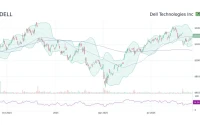YOUR GENERATED TITLE:
The Crypto Revolution Died and BNY Mellon Is Wearing Its Skin
*
Let’s just take a moment of silence for the crypto revolution. It had a good run. All that talk of decentralization, of banking the unbanked, of a trustless new world order free from the dusty old men in suits. It was a nice story. And now, OpenEden just announced that the 241-year-old Bank of New York Mellon is going to be the official hall monitor for its tokenized Treasury fund.
Give me a break.
This is it. This is the moment the punk rock band signs with the major label and starts writing car commercial jingles. On August 13th, OpenEden, a company that built its entire identity on bridging the gap between old money and new tech, proudly announced that BNY would be the investment manager and primary custodian for its $TBILL Fund.
Jeremy Ng, OpenEden’s founder, called it a "critical milestone" that will "create a new standard for trust and access in the digital asset space."
Let me translate that for you. "New standard for trust" is PR-speak for "We finally got a real bank to co-sign our project so you'll stop thinking it might all disappear overnight." It’s the crypto equivalent of your sketchy friend bringing his lawyer dad to a parent-teacher conference to vouch for him. The entire point of DeFi was supposed to be that the code, the protocol, was the trust. Now, trust is just a legacy brand with a skyscraper in Manhattan.
And BNY, offcourse, is "excited." Jose Minaya, their Global Head of something-or-other, said they're "excited to extend our time-tested liquidity investment management capabilities and asset safekeeping services." Of course they’re excited. They get to slap their name on the "disruptive" new thing, charge some fees, and take basically zero risk while the crypto kids do all the work. The house always wins.
Is This Progress, or Just TradFi in a Hoodie?
From "Trustless" to "Trust Us, We Have a Banker"
So what is this thing, exactly? OpenEden has been around since 2022, operating out of the usual, regulation-light locales like the British Virgin Islands. Their big play is "Real-World Asset" tokenization. They take a U.S. Treasury Bill—a piece of paper that is basically the safest, most boring investment on planet Earth—and wrap it in a digital token called $TBILL.
It’s an interesting idea, I guess. It even got an "A" rating from Moody's, which is more than you can say for most of the junk floating around the blockchain. But the irony is so thick you could cut it with a knife. To make crypto "safe," they had to run screaming back to the most centralized, traditional, and regulated asset in existence and get the oldest bank in America to hold it for them.

This ain't decentralization. It’s just TradFi with a new user interface.
This whole situation reminds me of the time I tried to close a simple savings account at one of these big, "time-tested" banks. It took three in-person visits, two phone calls where I was on hold for a cumulative 90 minutes, and a signature that had to be notarized. For my own money. These are the institutions we're now celebrating as the saviors of digital finance? This is progress?
The whole thing is a bad idea. No, 'bad' doesn't cover it—this is a capitulation. It’s an admission that the original premise of a parallel financial system was either a fantasy or, more likely, just a marketing slogan to get the initial hype train rolling.
The Future of Finance or Just a Shinier Casino Chip?
Now, For the Retail Exit Liquidity
And right on cue, here come the exchanges to sell this story to the masses. Binance, the undisputed king of the crypto casino, just launched OpenEden’s governance token, EDEN, as its 47th "HODLer Airdrops" project. They literally dropped free tokens into the accounts of people holding their own BNB coin, a tactic designed to do one thing: generate instant buzz and trading volume.
Spot trading for EDEN lit up on September 30th. You can buy it with USDT, USDC, BNB, whatever flavor of stablecoin you prefer. Coinone in Korea is listing it, too. The machine is humming.
But here’s the kicker. Even as Binance promotes this thing, they’ve slapped their "Seed Tag" on the EDEN token. For those not fluent in crypto-ese, that’s a polite warning label that basically means: "This is a new, highly volatile project. It might go to the moon, or it might go to zero. Don't come crying to us if you lose your shirt."
So on one hand, you have the BNY Mellon seal of approval—the ultimate symbol of boomer-friendly safety and stability. And on the other hand, you have the exchange itself telling you this is a high-risk gamble. Which is it? Is this the future of finance, a stable bridge to tokenized assets? Or is it just another altcoin for degens to flip before the music stops?
They want us to believe it can be both, that this unholy marriage of a 240-year-old bank and a BVI-based crypto firm is some kind of stable genius move, and honestly…
Maybe I'm the crazy one here. Maybe this is the only way forward. Maybe the dream of pure DeFi was always a childish fantasy, and the only way to get real adoption is to put on a tie, get a haircut, and beg the old guard for a seat at their table. But it feels like we lost something important along the way. The rebellion is over. The suits won. They always do.
Meet the New Boss, Same as the Old Boss
They didn't build a new system. They just built a convoluted, blockchain-powered on-ramp to the old one. The "revolution" was just a pitch deck to get funding form the very people they claimed they were going to make obsolete. And now everyone involved is going to get very, very rich selling that story.
Reference article source:









